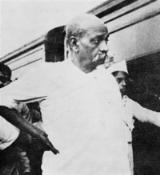
Sardar Vallabhbhai Patel
Vallabhbhai Patel was a major political and social leader of India and its struggle for independence, and is credited for achieving the political integration of India. In India and across the world, he is known as Sardar Vallabhbhai Patel, where Sardar stands for Chief in many languages of India.
Born and raised in the countryside of Gujarat, Vallabhbhai Patel was a self-educated, forceful and successful Gujarati lawyer, when he was inspired by the work and philosophy of Mohandas Gandhi. Patel organized the peasants of Kheda and Bardoli in Gujarat in non-violent mass civil disobedience against the oppressive tax policies imposed by the British Raj - becoming the one of the most influential leader in Gujarat. He rose to the national leadership of the Indian National Congress and at the forefront of rebellions and political events — organizing the party for elections in 1934 and 1937, and helping lead Indians into the Quit India movement. He was imprisoned by the British government on numerous occasions, especially from 1931 to 1934, and from 1942 to 1945. Patel was known amongst nationalists as "Gandhi's lieutenant," and he enjoyed considerable support and respect in the Congress for his decisive and straight-forward leadership.
Becoming the first Home Minister and Deputy Prime Minister of India, Patel organized relief and rehabilitation efforts in the riot-struck Punjab and Delhi, and leading efforts to restore peace and security. Patel took charge of the task to forge a united India from a plethora of semi-independent princely states, colonial provinces and possessions. Patel employed an iron fist in a velvet glove diplomacy mdash; frank political negotiations backed with the option (and the use) of military action to weld a nation that could emancipate its people without the prospect of divisions or civil conflict. His leadership obtained the peaceful and swift integration of all 565 princely states into the Republic of India. Patel's initiatives spread democracy extensively across India, and re-organized the states to help transform India into a modern federal republic. His admirers call him the Iron Man of India. He is also remembered as the "patron saint" of India's civil servants for his defence of them against political attack, and for being one of the earliest and key defenders of property rights and free enterprise in independent India.
Born and raised in the countryside of Gujarat, Vallabhbhai Patel was a self-educated, forceful and successful Gujarati lawyer, when he was inspired by the work and philosophy of Mohandas Gandhi. Patel organized the peasants of Kheda and Bardoli in Gujarat in non-violent mass civil disobedience against the oppressive tax policies imposed by the British Raj - becoming the one of the most influential leader in Gujarat. He rose to the national leadership of the Indian National Congress and at the forefront of rebellions and political events — organizing the party for elections in 1934 and 1937, and helping lead Indians into the Quit India movement. He was imprisoned by the British government on numerous occasions, especially from 1931 to 1934, and from 1942 to 1945. Patel was known amongst nationalists as "Gandhi's lieutenant," and he enjoyed considerable support and respect in the Congress for his decisive and straight-forward leadership.
Becoming the first Home Minister and Deputy Prime Minister of India, Patel organized relief and rehabilitation efforts in the riot-struck Punjab and Delhi, and leading efforts to restore peace and security. Patel took charge of the task to forge a united India from a plethora of semi-independent princely states, colonial provinces and possessions. Patel employed an iron fist in a velvet glove diplomacy mdash; frank political negotiations backed with the option (and the use) of military action to weld a nation that could emancipate its people without the prospect of divisions or civil conflict. His leadership obtained the peaceful and swift integration of all 565 princely states into the Republic of India. Patel's initiatives spread democracy extensively across India, and re-organized the states to help transform India into a modern federal republic. His admirers call him the Iron Man of India. He is also remembered as the "patron saint" of India's civil servants for his defence of them against political attack, and for being one of the earliest and key defenders of property rights and free enterprise in independent India.
Quotes
- Patel's speech at Bahaddin College, Junagadh:"If Hyderabad does not see the writing on the wall, it goes the way Junagadh has gone. Pakistan attempted to set off Kashmir against Junagadh. When we raised the question of settlement in a democratic way, they (Pakistan) at once told us that they would consider it if we applied that policy to Kashmir. Our reply was that we would agree to Kashmir if they agreed to Hyderabad."
- Patel's presidential address to the Congress, 1931:"No one would die of starvation in independent India. Its grain would not be exported. Cloth would not be imported by it. Its leaders would neither use a foreign language nor rule from a remote place 7,000 feet above sea level. Its military expenditure would not be heavy. Its army would not subjugate its own people or other lands. Its best-paid officials would not earn a great deal more than its lowest-paid servants. And finding justice in it would be neither costly nor difficult."
